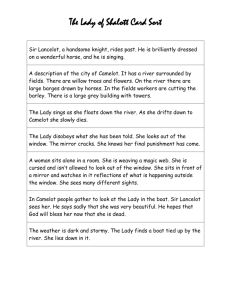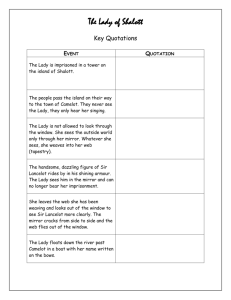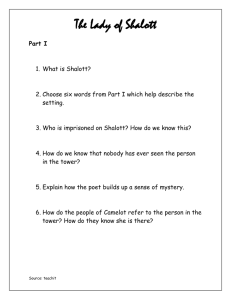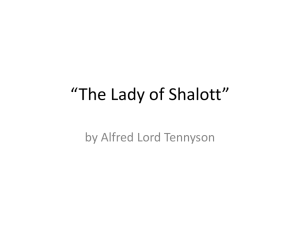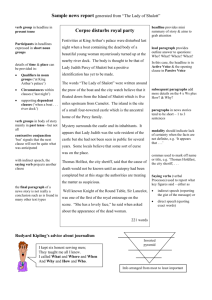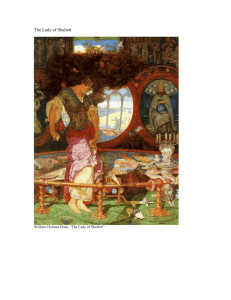Poetry Booklet
advertisement
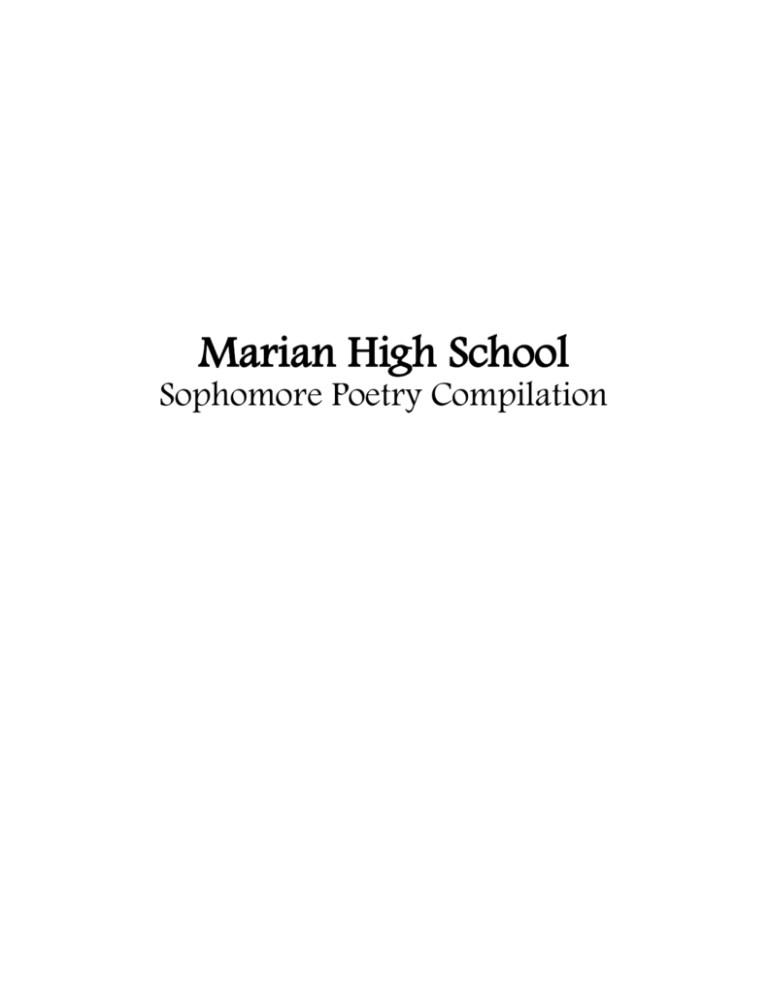
Marian High School Sophomore Poetry Compilation 2 Table of Contents Terminology 3 God’s Grandeur 5 The Lady of Shalott 7 The Stone 16 I Heard a Fly Buzz 21 3 Terminology Allusion: Imagery: The Speaker Narrative: Lyric: Figurative Language Simile: Metaphor: Personification: Hyperbole: Sound Devices Alliteration: Assonance: Consonance: Onomatopoeia: Poetic Meter 4 Meter: Foot: Iambic: Trochaic: Trimeter: Tetrameter: Pentameter: Hexameter: Heptameter: Octameter: Poetic Forms: Quatrain: Shakespearean (Elizabethan) Sonnet: Petrarchan (Italian) Sonnet: Blank Verse: Free Verse: 5 Gerard Manley Hopkins (1844–89). 7. God’s Grandeur THE WORLD is charged with the grandeur of God. It will flame out, like shining from shook foil; It gathers to a greatness, like the ooze of oil Crushed. Why do men then now not reck1 his rod2? Generations have trod, have trod, have trod; And all is seared with trade; bleared, smeared with toil; And wears man’s smudge and shares man’s smell: the soil Is bare now, nor can foot feel, being shod. And for all this, nature is never spent; There lives the dearest freshness deep down things; And though the last lights off the black West went Oh, morning, at the brown brink eastward, springs— Because the Holy Ghost over the bent World broods with warm breast and with ah! bright wings. 5 10 1 – Identify the sound devices used in this poem, and cite the lines they are found in. 1 2 To be concerned with; to recognize the importance of A staff, wand, stick, etc. that (in earlier cultures) was a symbol of authority. 6 2 – Hopkins is known for his creative syntax. What phrases surprise you by their unconventionality? Can you still understand what they mean? 3 – Is this a lyric or narrative poem? 4 – What is Hopkins’ essential argument? Do you agree with him? Alfred Tennyson, Lord Tennyson (1809–1892) 7 The Lady of Shalott PART I ON either side the river lie Long fields of barley and of rye, That clothe the wold and meet the sky; And thro' the field the road runs by To many-tower'd Camelot; And up and down the people go, Gazing where the lilies blow Round an island there below, The island of Shalott. Willows whiten, aspens quiver, Little breezes dusk and shiver Thro' the wave that runs for ever By the island in the river Flowing down to Camelot. Four gray walls, and four gray towers, Overlook a space of flowers, And the silent isle imbowers The Lady of Shalott. By the margin, willow-veil'd, Slide the heavy barges trail'd By slow horses; and unhail'd The shallop3 flitteth silken-sail'd Skimming down to Camelot: But who hath seen her wave her hand? 3 A sail boat used in shallow water. 5 10 15 20 8 Or at the casement4 seen her stand? Or is she known in all the land, The Lady of Shalott? Only reapers, reaping early In among the bearded barley, Hear a song that echoes cheerly From the river winding clearly, Down to tower'd Camelot: And by the moon the reaper weary, Piling sheaves in uplands airy, Listening, whispers ''Tis the fairy Lady of Shalott.' 25 30 35 PART II There she weaves by night and day A magic web with colours gay. She has heard a whisper say, A curse is on her if she stay To look down to Camelot. She knows not what the curse may be, And so she weaveth steadily, And little other care hath she, The Lady of Shalott. And moving thro' a mirror clear That hangs before her all the year, Shadows of the world appear. There she sees the highway near Winding down to Camelot: There the river eddy whirls, 4 A window 40 45 50 9 And there the surly village-churls,5 And the red cloaks of market girls, Pass onward from Shalott. Sometimes a troop of damsels glad, An abbot on an ambling pad, Sometimes a curly shepherd-lad, Or long-hair'd page in crimson clad, Goes by to tower'd Camelot; And sometimes thro' the mirror blue The knights come riding two and two: She hath no loyal knight and true, The Lady of Shalott. But in her web she still delights To weave the mirror's magic sights, For often thro' the silent nights A funeral, with plumes and lights, And music, went to Camelot: Or when the moon was overhead, Came two young lovers lately wed; 'I am half sick of shadows,' said The Lady of Shalott. 55 60 65 70 PART III A bow-shot from her bower-eaves, He rode between the barley-sheaves, The sun came dazzling thro' the leaves, And flamed upon the brazen greaves Of bold Sir Lancelot. A red-cross knight for ever kneel'd 5 A peasant or low-ranking freeman 75 10 To a lady in his shield, That sparkled on the yellow field, Beside remote Shalott. The gemmy bridle glitter'd free, Like to some branch of stars we see Hung in the golden Galaxy. The bridle bells rang merrily As he rode down to Camelot: And from his blazon'd baldric slung A mighty silver bugle hung, And as he rode his armour rung, Beside remote Shalott. All in the blue unclouded weather Thick-jewell'd shone the saddle-leather, The helmet and the helmet-feather Burn'd like one burning flame together, As he rode down to Camelot. As often thro' the purple night, Below the starry clusters bright, Some bearded meteor, trailing light, Moves over still Shalott. His broad clear brow in sunlight glow'd; On burnish'd hooves his war-horse trode; From underneath his helmet flow'd His coal-black curls as on he rode, As he rode down to Camelot. From the bank and from the river He flash'd into the crystal mirror, 'Tirra lirra,' by the river Sang Sir Lancelot. 80 85 90 95 100 105 11 She left the web, she left the loom, She made three paces thro' the room, She saw the water-lily bloom, She saw the helmet and the plume, She look'd down to Camelot. Out flew the web and floated wide; The mirror crack'd from side to side; 'The curse is come upon me!' cried The Lady of Shalott. 110 115 PART IV In the stormy east-wind straining, The pale yellow woods were waning, The broad stream in his banks complaining, Heavily the low sky raining Over tower'd Camelot; Down she came and found a boat Beneath a willow left afloat, And round about the prow she wrote The Lady of Shalott. And down the river's dim expanse— Like some bold seer in a trance, Seeing all his own mischance— With a glassy countenance Did she look to Camelot. And at the closing of the day She loosed the chain, and down she lay; The broad stream bore her far away, The Lady of Shalott. 120 125 130 135 12 Lying, robed in snowy white That loosely flew to left and right— The leaves upon her falling light— Thro' the noises of the night She floated down to Camelot: And as the boat-head wound along The willowy hills and fields among, They heard her singing her last song, The Lady of Shalott. Heard a carol, mournful, holy, Chanted loudly, chanted lowly, Till her blood was frozen slowly, And her eyes were darken'd wholly, Turn'd to tower'd Camelot; For ere she reach'd upon the tide The first house by the water-side, Singing in her song she died, The Lady of Shalott. Under tower and balcony, By garden-wall and gallery, A gleaming shape she floated by, Dead-pale between the houses high, Silent into Camelot. Out upon the wharfs they came, Knight and burgher, lord and dame, And round the prow they read her name, The Lady of Shalott. Who is this? and what is here? And in the lighted palace near Died the sound of royal cheer; And they cross'd themselves for fear, 140 145 150 155 160 165 13 All the knights at Camelot: But Lancelot mused a little space; He said, 'She has a lovely face; God in His mercy lend her grace, The Lady of Shalott.' 170 1 – What is the significance of the mirror? 2 – What images does the Lady of Shalott weave? 3 – Since narrative poetry tells a story, it should follow the usual plot structure. Identify the climax. 4a – Where does the poet use repetition? 14 4b – Why do you think the poet uses this repetition? 5 – Where does the repetition change? 5b – Why do you think the repetition changes? 15 6 – What do you think of Sir Lancelot’s final lines? 7 – What are your favorite lines? Wilfrid Wilson Gibson (1878 – ) 16 The Stone "AND will you cut a stone for him, To set above his head? And will you cut a stone for him— A stone for him?" she said. Three days before, a splintered rock Had struck her lover dead— Had struck him in the quarry dead, Where, careless of the warning call, He loitered, while the shot was fired— A lively stripling, brave and tall, And sure of all his heart desired... A flash, a shock, A rumbling fall... And, broken 'neath the broken rock, A lifeless heap, with face of clay; And still as any stone he lay, With eyes that saw the end of all. I went to break the news to her; And I could hear my own heart beat With dread of what my lips might say But, some poor fool had sped before; And flinging wide her father's door, Had blurted out the news to her, Had struck her lover dead for her, Had struck the girl's heart dead in her, Had struck life, lifeless, at a word, And dropped it at her feet: Then hurried on his witless way, Scarce knowing she had heard. 5 10 15 20 25 17 And when I came, she stood, alone A woman, turned to stone: And, though no word at all she said, I knew that all was known. Because her heart was dead, She did not sigh nor moan, His mother wept: She could not weep. Her lover slept: She could not sleep. Three days, three nights, She did not stir: Three days, three nights, Were one to her, Who never closed her eyes From sunset to sunrise, From dawn to evenfall: Her tearless, staring eyes, That seeing naught, saw all. The fourth night when I came from work, I found her at my door. "And will you cut a stone for him?" She said: and spoke no more: But followed me, as I went in, And sank upon a chair; And fixed her grey eyes on my face, With still, unseeing stare. And, as she waited patiently, I could not bear to feel Those still, grey eyes that followed me, Those eyes that plucked the heart from me, 30 35 40 45 50 55 60 18 Those eyes that sucked the breath from me And curdled the warm blood in me, Those eyes that cut me to the bone, And pierced my marrow like cold steel. And so I rose, and sought a stone; And cut it, smooth and square: And, as I worked, she sat and watched, Beside me, in her chair. Night after night, by candlelight, I cut her lover's name: Night after night, so still and white, And like a ghost she came; And sat beside me in her chair; And watched with eyes aflame. 65 She eyed each stroke; And hardly stirred: She never spoke A single word: And not a sound or murmur broke The quiet, save the mallet-stroke. 75 70 80 With still eyes ever on my hands, With eyes that seemed to burn my hands, My wincing, overwearied hands, She watched, with bloodless lips apart, And silent, indrawn breath: And every stroke my chisel cut, Death cut still deeper in her heart: The two of us were chiselling, Together, I and death. 85 And when at length the job was done, 90 19 And I had laid the mallet by, As if, at last, her peace were won, She breathed his name; and, with a sigh, Passed slowly through the open door: And never crossed my threshold more. Next night I laboured late, alone, To cut her name upon the stone. 1 – How does the man die? 2 – What job is the narrator given? By whom? 3 – What do the last three lines suggest? 4 – What lines foreshadow the ending of the poem? 95 20 5 – What are your favorite lines? Why? "I ... am small, like the wren; and my hair is bold, like the chestnut burr; and my eyes, like the sherry in the glass that the guest leaves." – Letter to 21 Thomas Wentworth Higginson, her literary advisor. Emily Dickinson (1830 – 1886) I Heard a Fly Buzz I HEARD a fly buzz when I died; The stillness round my form Was like the stillness in the air Between the heaves of storm. The eyes beside had wrung them dry, And breaths were gathering sure For that last onset, when the king Be witnessed in his power. I willed my keepsakes, signed away What portion of me I Could make assignable,—and then There interposed a fly, With blue, uncertain, stumbling buzz, Between the light and me; And then the windows failed, and then I could not see to see. 5 10 15 1 – Identify your favorite lines. Why do you like them? 2 – Identify a figurative language device that is used and reference the line where it is found. 22 3 – Is this poem narrative or lyric? 3 – What is the form is used? 4 – What might Emily Dickinson mean when she describes her eyes, “like the sherry in the glass that the guest leaves"? 23 Alfred Tennyson, 1st Baron (1809–92) The Charge of the Light Brigade HALF a league, half a league, Half a league onward, All in the valley of Death Rode the six hundred. “Forward, the Light Brigade! Charge for the guns!” he said: Into the valley of Death Rode the six hundred. “Forward, the Light Brigade!” Was there a man dismay’d? Not tho’ the soldier knew Some one had blunder’d: Theirs not to make reply, Theirs not to reason why, Theirs but to do and die: Into the valley of Death Rode the six hundred. Cannon to right of them, Cannon to left of them, Cannon in front of them Volley’d and thunder’d; Storm’d at with shot and shell, Boldly they rode and well, Into the jaws of Death, Into the mouth of Hell Rode the six hundred. 5 10 15 20 25 24 Flash’d all their sabres bare, Flash’d as they turn’d in air Sabring the gunners there, Charging an army, while All the world wonder’d: Plunged in the battery-smoke Right thro’ the line they broke; Cossack and Russian Reel’d from the sabre-stroke Shatter’d and sunder’d. Then they rode back, but not Not the six hundred. Cannon to right of them, Cannon to left of them, Cannon behind them Volley’d and thunder’d; Storm’d at with shot and shell, While horse and hero fell, They that had fought so well Came thro’ the jaws of Death, Back from the mouth of Hell, All that was left of them, Left of six hundred. When can their glory fade? O the wild charge they made! All the world wonder’d. Honor the charge they made! Honor the Light Brigade, Noble six hundred! 30 35 40 45 50 55 25 1 – Do you see any similarity in style, poetic devices used, or theme between “The Lady of Shalott” and “The Charge of the Light Brigade?” 2 – Is there a clear rhyme scheme? If so, what is it? 3 – What meter is used in this poem? Write the stress marks on the first stanza. 4 – Identify two sets of rhyming couplets.
